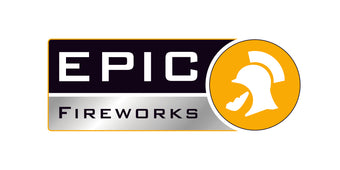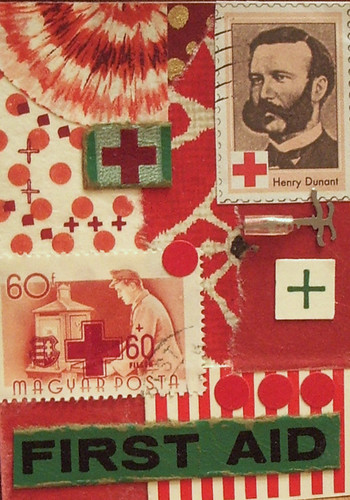Firework Safety For Home Fireworks Accidents
Although consumer fireworks are generally considered safe when proper procedures are followed, accidents due to intentional misuse or manufacturer defects can and do occur. Here are some first aid tips for handling home fireworks accidents. (Many thanks to Mel's First Aid ATC Picture shown above, great work Mel)
Every year, thousands of consumers purchase fireworks to celebrate Guy Fawkes Night or New Year's. In general, a site is selected that is free of flammable material and is suitable for the specific needs of the fireworks themselves. Conscientious users also provide a means of fire-prevention, usually a supply of sand or water. But despite these precautions, accidents involving home fireworks can and do occur with enough frequency to keep emergency rooms busy. Whether you are a participant or a casual observer at a home fireworks display, here are some first aid tips to keep in mind should an accident occur:
1. Before an accident has a chance to happen, take a proactive stance. Besides preparing for a firework that misfires, prepare for the possibility of a human misfire. Have a supply of gauze, hydrogen peroxide, ice water and other first aid supplies readily available. If an accident is severe enough to warrant a trip to the emergency room, you'll want to save as much time as possible. The sooner a bandage can be applied or a wound cleansed, the better for all involved.
2. Chemical burns: These are probably the most common injury connected with a defective firework. Rockets and other projectiles are designed to expel extremely hot gases towards the ground, so a severe chemical burn can occur in the first few seconds of a misfire. Assess the condition of whatever area of skin was exposed to the flame. If it appears reddened but not blistered, it is a first-degree burn and can be treated with an over-the-counter burn ointment and a loosely-wrapped gauze bandage and medical tape. If you notice blisters, the burn is at least second-degree and will require medical attention soon. DO NOT attempt to burst any blisters that form. Check to see if any chemical residue is still surrounding the wound. Some fireworks contain phosphorus, which can react with water and cause more burning, so do NOT wash the injury with water or peroxide if you suspect the presence of chemicals. Gently use a dry cloth to brush away loose materials around the burn. Place a dry gauze pad directly over the blistered area and secure it with a loosely wrapped piece of medical tape. Advise the victim not to do anything to the injured area, and arrange for professional medical treatment. If the injured area looks charred or tissue seems to be missing, the burn is third-degree and you need immediate professional medical assistance. Keep the victim calm and hydrated, and check for any signs of shock, such as shallow breathing or appearing 'spaced out' and disconnected. Because of the nerve damage that can accompany third-degree burns, these injuries may not register as painful to the victim, so don't be alarmed if they show no signs of apparent pain or suffering. Parents should especially be aware of sparklers around small children. The ignition point of these 'low-level' fireworks can reach the temperature of a welder's torch.
3. Severe lacerations and amputations. Many fireworks have an explosive stage and have the force necessary to completely sever fingers. Most of the time a firework is safely out of range before the explosion occurs, but intentional misuse or a faulty timing fuse can cause a powerful blast near the victim. If an unplanned explosion occurs, seconds may count. Immediately assess the injury on the field. Are all body parts accounted for? Even if an amputation has not occurred, the damage to the hand and fingers can be extensive. Bleeding is your first concern. Excessive blood loss can cause the victim to go into shock. Apply a gauze pad directly to the wound and maintain pressure. Have someone else contact professional medical help. If there is an amputation, scan the area for the missing body part. Enlist bystanders to aid in this search since your own priority should be the victim. If the part is found, store it in a plastic bag. Ice would also be acceptable. If none of these materials is readily available, do not waste valuable time looking for them. Place the part in a container and make sure the medical professionals receive it. Amputated parts may or may not be reattachable, but your patient's overall health takes precedence.
4. Eye injury. These are not common injuries if all safety procedures are followed, but occasionally a misfired firework may send a shower of sparks flying in all directions, including the eye area. Sparklers commonly cause some minor eye injuries if the child holds the lit sparkler too close to the face. If an eye injury occurs, assess the victim for any other injuries. Advise them not to rub their eyes, which may cause the chemical to spread or the foreign object to scratch the eyeball. Lift the victim's eyelid and inspect the eyeball for any large particles or foreign objects. If you see an object that has embedded itself into the eye tissue, you should not attempt to remove it yourself. Transport the victim to professional medical treatment as soon as possible. If the irritant appears to be small and not embedded, then use a commercial eyewash product to remove the chemical. In an emergency, use regular water to flush out the chemical. The chances of getting an infection from tap water are remote compared to the chances of permanent eye tissue damage by doing nothing. Continue flushing the eye with water for several minutes. Have the victim consult their eye doctor or other professional for further treatment. While a spark from a sparkler may be very painful to a child, the actual amount of foreign material is generally very small. Use a commercial eye care product to soothe the irritation, and assure the child that there is no permanent injury.

